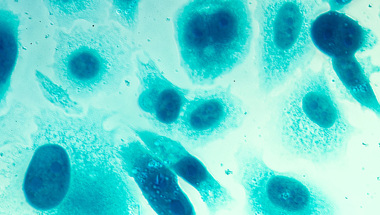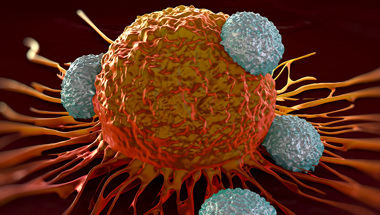
Developing a new combination therapy for incurable prostate cancer

Grant information
Researchers: Dr Francesco Crea
Institution: Open University
Grant award: £620,153
Reference: RIA22-ST2-006
What you need to know
- The researchers are working on a new treatment for a type of prostate cancer called neuroendocrine prostate cancer, which is currently incurable.
- This treatment would be personalised, targeting specific genes in the cancer cells.
- The researchers will also develop a blood test that can predict how well the treatment will work. This test would help doctors decide which men will benefit from the therapy and monitor their progress during treatment.
What will the researchers do?
Dr Crea and his team aim to develop a new, personalised treatment for neuroendocrine prostate cancer, which is very aggressive and currently has no cure.
They will work on two important things: treatment and testing. For the first part, they will develop a treatment that can ‘reprogram’ the cancer cells in the prostate, byswitching key genes on and off. The researchers believe that the reprogramming will make the cancer cells easier to treat with conventional cancer therapies like chemotherapy.
Then they will try different combinations of chemotherapy drugs to find which works best when combined with the reprogramming drug.
In parallel, they will develop a blood test that can check which genes are on or off in the cancer. At diagnosis, this test could let doctors know if a man would benefit from the reprogramming treatment, but it could also be used during treatment to see if the combination of reprogramming drug and chemotherapy is working well.
They will also check if the test results are consistent at detecting cancers that are susceptible to this treatment and can predict how well the drugs will work.
This award will enable my team to bring forward a project that started with my PhD, when I tested the first EZH2 inhibitors at the US National Cancer Institute. Now we have precision medicine tools to target this protein and to select the patients that are more likely to benefit from the treatment. Our multidisciplinary team (two companies, and academic collaborators in UK, Italy and Canada) will work to improve the lives of patients with the most aggressive form of prostate cancer.
How will this benefit men?
Neuroendocrine prostate cancer is a serious and hard-to-treat disease. Most people with it live for less than a year after they are diagnosed, and existing treatments are mostly palliative, relying on relieving symptoms.
If this research is successful, men with this kind of prostate cancer could be offered a personalised treatment (following a blood test to check if they will respond to it), and as a result live longer and have a much better quality of life than is currently possible.
Help us fund more research like this
Your donation helps us fund lifesaving research into better treatments for prostate cancer.



